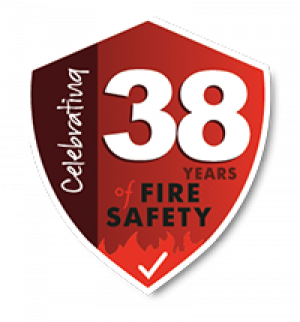What Type of Fire Extinguisher Should Be Used On Combustible Materials
19th Jan 2023

The most common type of fires are Class-A fires which are produced from combustible materials. These consist of everyday, organic materials such as wood or paper - substances that can easily ignite and burn.
As with all classes of fire, a specific type of fire extinguisher has been designed to be suitable with the materials or substances that have caught alight. Therefore, it’s an essential part of fire-safety to instantly establish which is the correct type of fire extinguisher for each scenario you might encounter.
This will help to avoid wasting any precious time in an emergency, and to prevent a fire from re-igniting or intensifying. With this knowledge, you’ll also know which fire extinguishers are best to have installed in your workplace, ensuring your premises meet all the necessary safety regulations.
In this article, we take a closer look at which type of fire extinguishers are used for tackling fires with combustible materials.
What are common types of combustible materials
Wood, paper, textiles and coal are common examples of combustible materials.
These are defined by their ability to ignite and burn after being heated in the presence of oxygen.
Which fire extinguishers can be used for combustible materials?
Since combustible materials need to be heated in order burn, most effective class A extinguishing agents contain wate, which cools the substrate to the point where it can no longer support combustion.
Water based fire extinguishers
Water fire extinguishers are perfectly suitable for tackling fires that involve combustible materials.
Water fire extinguishers have the ability to extinguish the flames and put out the fire completely – provided that the fire is not too large for the test rating of the extinguisher. Better yet, they won’t leave behind any chemical residue.
It’s important to keep in mind that water fire extinguishers should never be used for electrical fires, as this can be extremely dangerous. We cover which fire extinguishers to use on electrical fires in a sperate blog.
Similarly, it’s also dangerous to use water fire extinguishers with flammable liquid fires (class B) or chip pan fires (Class F). Instead, you would require a fire extinguishing agent that can form a barrier to oxygen reaching the fuel.
Download Our Non-Domestic Premises Guide
Foam fire extinguishers
Another type of fire extinguisher used for fires containing solid combustible materials and flammable liquids are foam extinguishers. They are a common recommendation for many workplaces and effective when extinguishing both Class-A and Class-B fires. Most are also rated as safe on fires involving live electrical equipment.
The extinguisher releases a foam to seal the burning material.
The foam works by creating a suffocating effect on the fire that very quickly limits the fire’s oxygen supply.
Foam extinguishers are suitable for solid materials and flammable liquids such as petrol fuel and oil, but they are not safe for fires involving cooking oils or fats. These require a more specialised class F rated extinguisher..
In recent years a number of variants on the water / foam theme have been developed which typically offer a high fire rating for their size and are suitable for use on incidental electrical risks.
Dry powder fire extinguishers
Most modern dry powder extinguishers can tackle class A fires, but they work in a different way to water based products. Instead of cooling the substrate, the chemical agent forms a barrier to stop oxygen getting through.
They do make a serious mess though, and electrical components may be corroded if the powder remains in contact with them. They should not be used in confined spaces due to the risks of low visibility and inhalation.
Selecting the wrong fire extinguisher could have dangerous and devastating consequences. There’s no substitute for developing a good understanding of the differences between each of the 6 fire classifications and range of fire extinguishers designed to prevent a fire from re-igniting. See our detailed guide to all of the fire extinguisher types and when to you use them.
Are you considering which fire extinguishers are suitable for your workplace? To find out more about how we can help you and your business with fire safety compliance, training and extinguisher maintenance contact us today.





